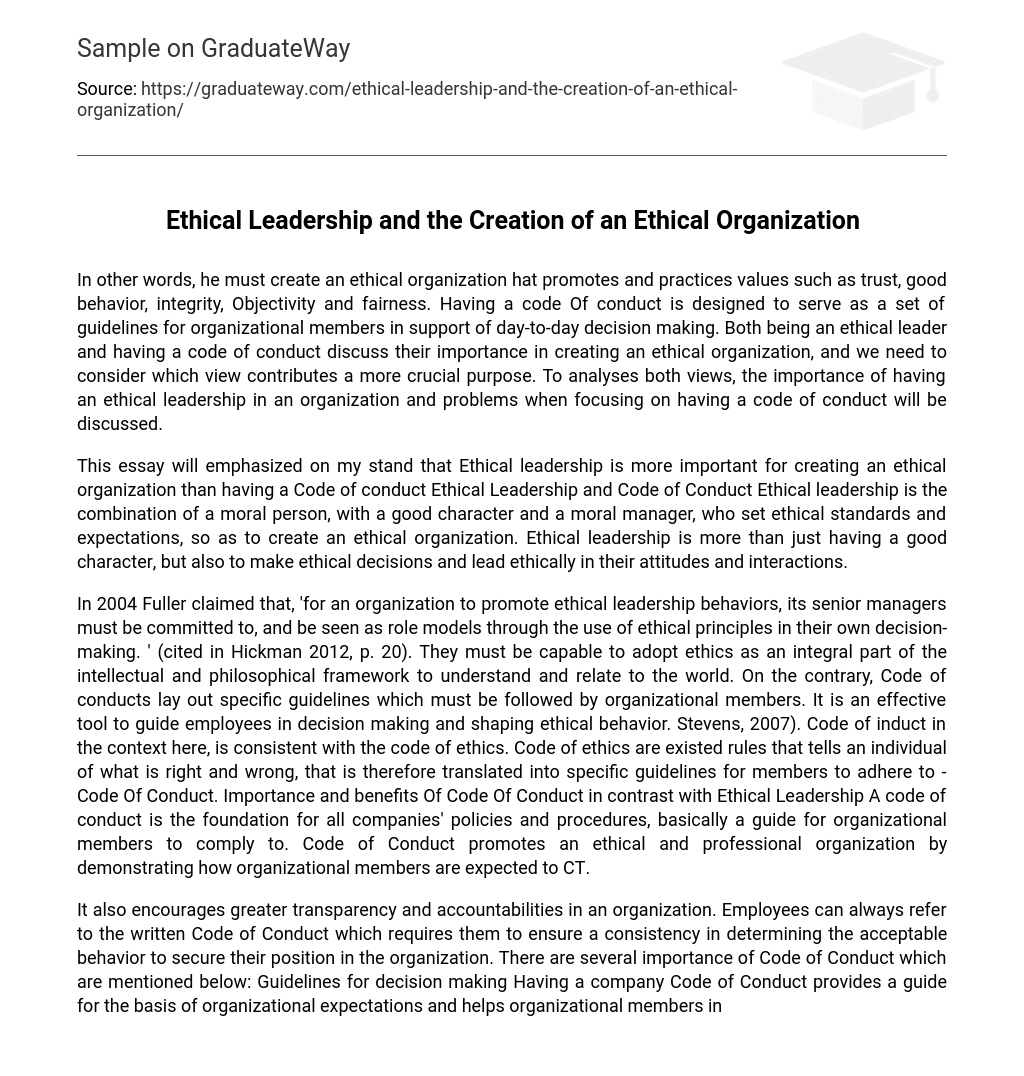In other words, he must create an ethical organization hat promotes and practices values such as trust, good behavior, integrity, Objectivity and fairness. Having a code Of conduct is designed to serve as a set of guidelines for organizational members in support of day-to-day decision making. Both being an ethical leader and having a code of conduct discuss their importance in creating an ethical organization, and we need to consider which view contributes a more crucial purpose. To analyses both views, the importance of having an ethical leadership in an organization and problems when focusing on having a code of conduct will be discussed.
This essay will emphasized on my stand that Ethical leadership is more important for creating an ethical organization than having a Code of conduct Ethical Leadership and Code of Conduct Ethical leadership is the combination of a moral person, with a good character and a moral manager, who set ethical standards and expectations, so as to create an ethical organization. Ethical leadership is more than just having a good character, but also to make ethical decisions and lead ethically in their attitudes and interactions.
In 2004 Fuller claimed that, ‘for an organization to promote ethical leadership behaviors, its senior managers must be committed to, and be seen as role models through the use of ethical principles in their own decision-making. ‘ (cited in Hickman 2012, p. 20). They must be capable to adopt ethics as an integral part of the intellectual and philosophical framework to understand and relate to the world. On the contrary, Code of conducts lay out specific guidelines which must be followed by organizational members. It is an effective tool to guide employees in decision making and shaping ethical behavior. Stevens, 2007). Code of induct in the context here, is consistent with the code of ethics. Code of ethics are existed rules that tells an individual of what is right and wrong, that is therefore translated into specific guidelines for members to adhere to – Code Of Conduct. Importance and benefits Of Code Of Conduct in contrast with Ethical Leadership A code of conduct is the foundation for all companies’ policies and procedures, basically a guide for organizational members to comply to. Code of Conduct promotes an ethical and professional organization by demonstrating how organizational members are expected to CT.
It also encourages greater transparency and accountabilities in an organization. Employees can always refer to the written Code of Conduct which requires them to ensure a consistency in determining the acceptable behavior to secure their position in the organization. There are several importance of Code of Conduct which are mentioned below: Guidelines for decision making Having a company Code of Conduct provides a guide for the basis of organizational expectations and helps organizational members in their day- to-day decisions.
In times when decisions made are based upon ethical rules n compliance of compromising or personal temptation, those written Code of Conduct can come in place to prevent any unethical decisions. Hence, ‘the written rules’ serves as an assurance to maintain an ethical organization. Positive Reputation Besides the above mentioned, Code of Conduct enhance a positive reputation Of an Organization in the business environment. Proudly displaying the company’s Code of Conduct on the company’s website or in press releases, aid in creating a positive image among consumers and demonstrate the company’s values to socially responsible investors.
Also, there is a need to ensure that actions made are always align with the words. A comprehensive Code of Conduct can keep a company out of legal trouble. For instance, if a single employee were to commit a criminal act in the name of the organization, the Code of Conducts can help to convince the court that the company does not endorse that kind of behavior. Consequently, a good organization’s reputation is equivalent to happy employees and all the more they will strive to achieve outstanding performance ethically. Promotes Communication At the same time, Code of Conduct creates an organizational culture of an onset and open communication.
Through this, it allows organizational members to openly express their feedbacks and comments concerning ethical relations. Employees will be comfortable to ask questions regarding their actions and behavior to prevent any mistakes or wrong decisions. As a result, a Code of Conduct helps to maintain an ethical standard in the organization. It also helps members to look after one another to ensure their actions aligns with the organization’s objectives. Criticisms of Ethical Leadership In contrast, if Ethical leadership replaces Code of Conduct in an organization, ethical dilemma may occur.
The criticisms of having Ethical leadership in an organization is that, it involves managers Of the higher up in subordinating the employees. In 2001 Aaron’s states that ‘Coos are obliged to set a moral example for organizational members and to demarcate the constant striving for increased profits from those activities which may be detrimental to the values of society in general. ‘ Leaders may be well recognized but some may misuse their power, and their acts and decisions may not be perceive as ethical in the concept of others.
It may also results in employees relying too evilly on their ethical leaders in their actions and decision making, thus, do not see the purpose of having own ethical conduct. Employees will tend to expect more from their leaders in being a good person at all times. If the ethical leader unintentionally made a mistake, there may be an aftermath of employees taking advantage of the situation against the leader. After all, in today’s world, most members in an organization concede that all rules should be written down in black and white. With those rules stated, they have no reason but to comply with ethical practices.





